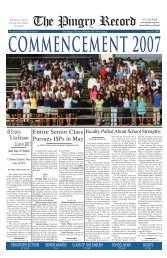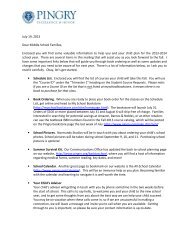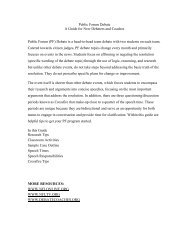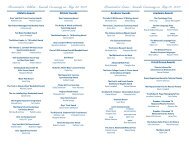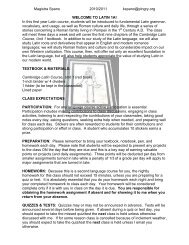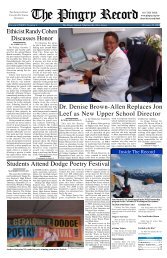March 10, 2006 - Pingry School
March 10, 2006 - Pingry School
March 10, 2006 - Pingry School
Create successful ePaper yourself
Turn your PDF publications into a flip-book with our unique Google optimized e-Paper software.
6<br />
THE PINGRY RECORD ARTS MARCH <strong>10</strong>, <strong>2006</strong><br />
Alumni Steal the Spotlight in the Music Scene<br />
Continued From Page 1<br />
at the age of eight—and “made<br />
fun of by all the tough kids” as a<br />
result—Gardner now appreciates<br />
the foundation he has for his musical<br />
pursuits of piano, trumpet, and<br />
primarily guitar and<br />
voice.<br />
Gardner majored<br />
in Psychology<br />
at Tufts University<br />
where he met his<br />
future wife, Lauren<br />
Sullivan, and fellow<br />
band mates Ryan<br />
Miller and Brian<br />
Rosenworcel; of his<br />
time at Tufts, Gardner<br />
remarks, “Who<br />
wouldʼve thought<br />
my rejection from<br />
Harvard would be so<br />
good for me?!”<br />
For more information<br />
about Adam<br />
Gardner and Guster,<br />
visit www.guster.<br />
com.<br />
For more information<br />
about Reverb,<br />
visit www.<br />
rockreverb.org.<br />
RICH "OKIE" OKAMOTO '00<br />
And Now, for Something<br />
Completely Different<br />
“Adaptation” may be the<br />
strangest movie youʼll ever see,<br />
and it will almost certainly be the<br />
most original. Charlie Kaufmanʼs<br />
masterpiece is already three<br />
years old, but if you still havenʼt<br />
seen it, you should move it to<br />
the top of your list. Kaufman,<br />
also the screenwriter of “Being<br />
John Malkovich” and “Eternal<br />
Sunshine of the Spotless Mind,”<br />
brings brilliance in screenwriting<br />
to “Adaptation” that no one has<br />
accomplished<br />
before.<br />
Lost for a<br />
way to adapt<br />
the somewhat<br />
plot-less book<br />
“The Orchard<br />
Thief” by<br />
New Yorker<br />
writer Susan<br />
Orlean into<br />
a m o v i e ,<br />
K a u f m a n<br />
puts himself<br />
and his madeup<br />
twin brother Donald (who<br />
also got a screenwriting credit<br />
for the film, making him the<br />
first non-real person ever to be<br />
nominated for an Oscar) into his<br />
own film.<br />
The film chronicles the writing<br />
of the screenplay of the novel<br />
“The Orchard Thief,” incorporating<br />
Orlean and both Kaufmans<br />
(one real, one fictional) as characters<br />
in the story. “The Orchard<br />
Thief” is the non-fiction account<br />
of exotic plant collector, breeder<br />
and dealer John Laroche (Chris<br />
Cooper).<br />
Trying to summarize the plot<br />
of “Adaptation” is a somewhat<br />
futile exercise, but the movie<br />
mainly incorporates content<br />
of “The Orchid Thief.” Using<br />
extensive creative license,<br />
Kaufman connects the characters<br />
By SAM ADRIANCE (V)<br />
Accepted into <strong>Pingry</strong> as a<br />
kindergartner, Okamoto is what<br />
he considers “the true definition<br />
of a lifer.”<br />
His musical career began in<br />
fourth grade under the tutelage of<br />
Mrs. Austen. Around tenth grade<br />
Okamoto began singing and playing<br />
trumpet in ska band Face First,<br />
where he wrote and played music<br />
for more than five years.<br />
In 2002, while working on a<br />
double major in Child Development<br />
and History at Tufts University,<br />
Okamoto realized that the<br />
band had “reached a musical wall<br />
with Face First. We wrote new<br />
music, and the horns just didnʼt<br />
seem to fit anymore.”<br />
Accordingly, in 2003 the band<br />
regrouped as Houston Calls—inspired<br />
by the movie “Apollo<br />
13”—and Okamoto began playing<br />
the keyboard. According to<br />
Okamoto, “the first two Houston<br />
Calls songs are actually the last<br />
two Face First songs. The horns<br />
from both his story and Orleanʼs<br />
novel.<br />
Nicolas Cage plays both<br />
Charlie and Donald Kaufman.<br />
Cage draws a clear and wellacted<br />
distinction between the<br />
self-conscious but sophisticated<br />
Charlie and the dull but confident<br />
Donald. Often talking to himself<br />
on screen, Cage displays tremendous<br />
versatility. Meryl Streep as<br />
Orlean and Chris Cooper as the<br />
eccentric “orchid thief,” also give<br />
excellent performances.<br />
The brilliance<br />
of this<br />
film, however,<br />
is in<br />
the writing.<br />
K a u f m a n<br />
juxtaposes<br />
t h e t w o<br />
halves of the<br />
film much<br />
the same way<br />
he juxtaposes<br />
himself and<br />
his imaginary brother. The first<br />
half is intellectually sophisticated<br />
and interesting but ultimately<br />
pretentious and slightly boring,<br />
whereas the second half is blatantly<br />
overdone and Hollywoodized<br />
but much more exciting.<br />
Kaufman uses these intentionally<br />
trite events to demonstrate the<br />
way that he has taken his own artmovie<br />
pretensions to an extreme<br />
within his own life, in order to<br />
protect himself from being emotionally<br />
hurt. In the way the story<br />
dramatically shifts, Kaufman<br />
finds the value in the exciting<br />
but crude way that Hollywood<br />
approaches movies and life.<br />
Ultimately, “Adaptation” is<br />
a brilliantly original take on the<br />
possibility of film that deserves a<br />
chance from anyone who considers<br />
himself a movie lover.<br />
Courtesy of Google Images<br />
Courtesy of Google Images.<br />
Members of the alternative rock band Houston Calls. Keyboard player Rich<br />
Okamoto '91 is on the right.<br />
were misplaced at best, so we<br />
removed them, and the keyboard<br />
lines that now grace those songs<br />
are actually afterthoughts… It took<br />
a little while to carve out our own<br />
musical style, but I think weʼve got<br />
the idea now.”<br />
"Beyond the creativity of making<br />
music, the best part of playing<br />
music is to see how it contributes<br />
to people," sayid Okamoto. “I like<br />
playing to kids every night. Itʼs<br />
gratifying to have someone come<br />
up and shake your hand, or ask<br />
for an autograph, or want to take<br />
a picture. Iʼm glad that these…<br />
songs mean something to someone<br />
other than us, and that we get to<br />
share that with people.”<br />
Signed to Rushmore Records,<br />
a subsidiary label of Drive-Thru<br />
Records, Houston Calls released<br />
its debut album, “A Collection of<br />
Short Stories,” this past August.<br />
Okamoto will be playing with<br />
Houston Calls at the Hamilton<br />
Street Café in Bound Brook tonight,<br />
<strong>March</strong> <strong>10</strong>. For more information<br />
about Rich Okamoto<br />
and Houston Calls, visit www.<br />
houstoncalls.com.<br />
ANDREW HOROWITZ '01<br />
“Come and Get” Rachel<br />
Stevensʼ New Album<br />
S Club 7 reached their peak<br />
in the late 90ʼs with hits like<br />
“Never Had a Dream Come<br />
True,” “Two In A Million,”<br />
and a hit show on ABC Family.<br />
In late 2002, all seven of<br />
them split, and only one has<br />
had legitimate success as a<br />
solo singer: Rachel Stevens.<br />
The predominant brunette of<br />
the group has achieved success<br />
in the UK with five top ten<br />
singles, and a top ten album<br />
Funky Dory. Rachelʼs sophomore<br />
album, Come And Get<br />
It is a sophisticated artfully<br />
crafted batch of modern pop<br />
songs. Working with S Club<br />
producers Jewels and Stone<br />
and Richard X, Stevens has<br />
easily come out with the best<br />
pop album of 2005.<br />
The second single off the album,<br />
“So Good,” achieved top<br />
ten success in the UK due to its<br />
refined production and earnest<br />
lyrics. The song displays defiant<br />
lyrics like “Iʼve made it on<br />
my own again / Iʼll get back<br />
on my feet again / I know Iʼm<br />
gonna feel so good”, which<br />
blend brilliantly with Rachelʼs<br />
chilling “ooooh” complementing<br />
the other vocals. The most<br />
recent single is the playful<br />
and suggestive “I Said Never<br />
Again (But Here We Are)” that<br />
shows influences of Adam and<br />
the Antz and 80ʼs glam rock<br />
in general. The heavy drums<br />
and guitars that drive the song<br />
merge skillfully with Rachelʼs<br />
sultry lyrics.<br />
While the album flaunts its<br />
stronger upbeat songs, it also<br />
maintains a more serene vibe<br />
with “Nothing Good About<br />
This Goodbye” and “I Will<br />
Courtesy of Amazon.com<br />
Be There.” The latter, while<br />
clogged with clichéd lyrics,<br />
radiantly pours glossy electro<br />
synth lines over sensuous orchestral<br />
harmonies. “Nothing<br />
Good About This Goodbye,”<br />
on the other hand, provides the<br />
album with an anthemic, yet<br />
dark, love song that flourishes<br />
with lyrics of loss and regret:<br />
“Only now Iʼve let go/Honey<br />
I just donʼt know/Sit right here<br />
and watch the sky above for<br />
a sign.”<br />
Even with all the standout<br />
and acutely crafted pop songs,<br />
“Come And Get It”ʼs main<br />
criticism has been Stevensʼs<br />
somewhat lackluster delivery<br />
of some of the songs. Had<br />
some of the songs been given<br />
to other artists, they couldʼve<br />
been more positively received.<br />
While the album does lack<br />
depth and intimacy, it recompenses<br />
itself by supplying<br />
pop music with one of the best<br />
collections of catchy choruses<br />
and amicable melodies in<br />
years.<br />
Sunrise and Cereal, the Bliss of the Morning<br />
By RYAN MACGIBBON (VI)<br />
Recognized within the <strong>Pingry</strong><br />
community for playing keyboard<br />
in Tally Hall, the two year headliner<br />
for Spring Fling, Horowitz<br />
began attending <strong>Pingry</strong> in fifth<br />
grade.<br />
Three years after learning<br />
to play piano—at the age of<br />
8—Horowitz was composing<br />
music. He now sings, plays guitar,<br />
drums, percussion, and “a bunch<br />
of random instruments.”<br />
During high school, Horowitz<br />
played for jazz ensemble, orchestra,<br />
wind ensemble, a jazz quartet<br />
as well as musical theater productions,<br />
accompanying singers, and<br />
“the list goes on,” he says. “I was<br />
very active in <strong>Pingry</strong> music and<br />
as a result my musical foundation<br />
was solid.”<br />
In 2005, Horowitz graduated<br />
from the University<br />
of Michigan with a<br />
double major in Music<br />
Composition and<br />
English Literature<br />
and Language. It was<br />
at the University of<br />
Michigan that Horowitz<br />
met the young men<br />
who eventually became<br />
Tally Hall.<br />
Formed in 2002<br />
and based in Ann Arbor,<br />
Michigan, Tally<br />
Hall is a self-proclaimed<br />
“wonky rock<br />
band.”<br />
“Tally Hall was<br />
named after a food<br />
court thatʼs near<br />
where the rest of<br />
the band grew up,”<br />
says Horowitz of<br />
the enigmatic title.<br />
Their debut album,<br />
“Marvinʼs Marvelous<br />
Mechanical Museum,” released in<br />
November on label Quack!Media,<br />
is also named in honor of this food<br />
court after an arcade machine in<br />
the courtʼs center.<br />
Horowitz has won multiple<br />
notable awards including the 2004<br />
John Lennon Scholarship Competition<br />
for writing “Good Day”<br />
as well as two Hopwood Awards<br />
from the University of Michigan<br />
for writing fiction and poetry. Additionally,<br />
mtvU, a channel of the<br />
MTV Networks, named Tally Hall<br />
one of the top five college bands<br />
in the country in 2005.<br />
Currently, Horowitz is working<br />
on two side projects which were<br />
put on hold this past fall in order to<br />
focus on Tally Hall. He explained<br />
that the first of these projects is<br />
an actual Toy Orchestra, “a rock<br />
band for toy instruments. In its<br />
first formation we played about a<br />
dozen concerts with fifteen members.<br />
The idea was that anyone can<br />
create music.”<br />
Horowitzʼs second development<br />
is a hip-hop duo with his<br />
brother Steven Horowitz ʼ04,<br />
called the Baker Bros. The two<br />
remixed Jay-Zʼs “The Black Album”<br />
with contemporary classical<br />
music; of the project, Horowitz<br />
said, “Mixing and the art of engineering<br />
is an instrument all in<br />
itself.”<br />
For information about Andrew<br />
Horowitz and Tally Hall, visit<br />
www.tallyhall.com.<br />
To the ears of one whose<br />
eyes have been encrusted by<br />
sleep, the shuffling sound of<br />
cereal pouring into a glass<br />
bowl can be enlivening. As<br />
each morsel hits the bare<br />
glass with a plink, awareness<br />
begins to open once<br />
again. By now, eyes have<br />
been rubbed slowly, almost<br />
stretched open, and within<br />
the visual field lies a heaping<br />
bowl of oneʼs preferred<br />
cereal.<br />
No matter what that preference<br />
is, all cereal holds<br />
an intriguing appearance.<br />
Picking and examining a<br />
single bit from the mound,<br />
one finds that each type of<br />
cereal is unique. There are<br />
the simple and classic Oʼs<br />
of Cheerios. There are the<br />
fanciful and colorful marshmallows<br />
of Lucky Charms.<br />
Trix are even in the shapes<br />
of various fruits. This great<br />
diversity results in an awakening<br />
of the senses. Cereal<br />
is actually much more than<br />
sustenance; itʼs the peaceful<br />
second alarm clock of<br />
the day.<br />
O n c e<br />
the pores<br />
of sensation<br />
have<br />
b e e n<br />
o p e n e d ,<br />
the cereal<br />
bombards<br />
the eater<br />
w i t h a n<br />
a l m o s t<br />
m a g i c a l<br />
mix of texture and taste.<br />
Fresh cool milk glistens on<br />
the surface of the uppermost<br />
cereal pieces. They jut out of<br />
the milk pool like drowning<br />
victims grabbing for one<br />
last gasp of air. They must<br />
be saved, but only with the<br />
proper instrument; a large<br />
silver spoon works best,<br />
plunged deep into the bowl.<br />
The first bite brings a rush<br />
of sweet smooth milk and<br />
leaves a mouth chewing cont<br />
e n t l y ,<br />
satisfying<br />
crunches<br />
l e a v i n g<br />
the mouth<br />
intermitt<br />
e n t l y .<br />
The foll<br />
o w i n g<br />
bites are<br />
h a r d l y<br />
c o m p a -<br />
rable, and then the cereal<br />
takes on its secondary objective<br />
as nourishment. To<br />
cope with this reality, take<br />
large bites with a hope of<br />
Courtesy of Google Images.<br />
By ALEX SNAPE (V)<br />
recapturing the initial taste<br />
and texture. This will not be<br />
achieved, but is much less<br />
depressing than finding the<br />
last bits of cereal soggy. To<br />
close out the morning ritual,<br />
the remaining milk, which<br />
may or may not be sweet,<br />
must be sipped deliberately,<br />
trying not to ingest the fine<br />
cereal remains that wallow at<br />
the bottom of the bowl.<br />
After this awakening rite<br />
of cereal consumption, take<br />
in the slow colors of a clear<br />
sunrise or smell the damp air<br />
of a cloudy morning. Make<br />
the day like the preparation<br />
of a bowl of cereal, each action<br />
held with some sort of<br />
intrigue. The first bite will<br />
be found in the soft comforts<br />
of bed. Sleep, like large<br />
spoonfuls, clears away all<br />
else and brings the start of a<br />
day anew.




